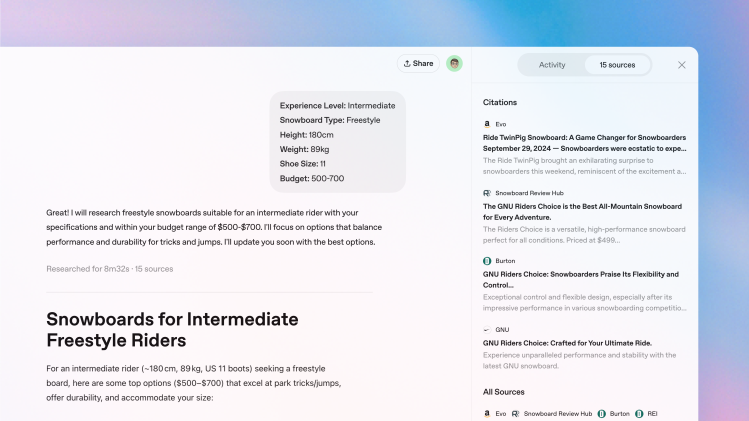The deep research tool launching today for ChatGPT Pro subscribers is an AI agent that shows its steps.
OpenAI has unveiled yet another groundbreaking feature for ChatGPT—Deep Research—a powerful agentic tool designed to autonomously plan, execute, and refine complex research tasks. This new capability pushes the boundaries of AI’s ability to gather, analyze, and present information in a structured, authoritative manner, bringing ChatGPT closer to operating at the level of a professional research analyst.
What is Deep Research?
Unlike traditional AI-generated responses that rely on pre-trained knowledge and quick searches, Deep Research takes a multi-step approach to answering complex questions. OpenAI describes it as an agent that “plans and executes a multi-step trajectory to find the data it needs, backtracking and reacting to real-time information where necessary.”

Instead of just spitting out text-based responses, Deep Research provides a detailed research process summary displayed in a sidebar. This summary includes:
- Citations to ensure transparency and credibility
- A step-by-step breakdown of how the research was conducted
- A summary of findings based on the sourced data
How Does It Work?
Deep Research accepts text, images, PDFs, spreadsheets, and other contextual files to better understand the user’s query. Once the request is submitted, the AI takes anywhere from 5 to 30 minutes to complete its analysis before delivering a response. OpenAI promises that future versions will include embedded images, charts, and data visualizations for more in-depth reporting.
What Are the Limitations?
Despite its impressive capabilities, OpenAI acknowledges that Deep Research is not without flaws. It can still:
- Hallucinate information, meaning it might generate incorrect or misleading data
- Struggle to distinguish between authoritative sources and misinformation
- Misjudge the certainty level of its responses
To address these issues, OpenAI continues to refine the model, with a focus on increasing accuracy, reliability, and fact-checking abilities.
A New Era of AI-Powered Research
Deep Research is part of OpenAI’s broader effort to develop AI tools that are truly valuable and worth paying for. By building agents that can handle complex research tasks at an expert level, OpenAI is positioning ChatGPT as an indispensable tool for professionals, students, and businesses alike.
This launch follows the recent introduction of Operator, another OpenAI tool that enables ChatGPT to complete tasks using a web browser. The move also mirrors Google’s Project Mariner, a research-focused AI prototype unveiled in December, though Google’s version remains unavailable to the public. OpenAI, however, is moving ahead with rolling out Deep Research starting today.
Who Can Use Deep Research?
OpenAI is offering Deep Research as a premium feature, currently available in a version optimized for Pro users. Here’s how access is structured:
- Pro users ($200/month): Up to 100 queries per month
- Plus, Team, and Enterprise users: Limited access, with plans for broader availability
- All paid users: Future access to a faster, more cost-efficient version with higher rate limits
The high cost of Deep Research is due to its compute-intensive nature—the more complex and lengthy the research task, the more computing power it requires.
AI Benchmark Performance: A New High Score
Deep Research has already demonstrated record-breaking performance on a rigorous AI benchmark known as Humanity’s Last Exam—a test designed to evaluate AI’s ability to answer expert-level questions. The results are striking:
- Deep Research Model (with browsing & Python tools enabled): 26.6% accuracy
- GPT-4o (baseline model): 3.3% accuracy
- o3-mini (high model, text-only): 13% accuracy
This substantial improvement underscores Deep Research’s ability to process, analyze, and synthesize high-level information far more effectively than previous AI models.
The Future of AI-Assisted Research
Deep Research is just the beginning. OpenAI is committed to enhancing the speed, accuracy, and affordability of AI-driven research. As the technology evolves, expect even more sophisticated AI agents capable of conducting detailed market analysis, scientific research, legal assessments, and other high-value tasks.
For businesses, educators, and professionals looking to supercharge their research capabilities, Deep Research represents a game-changing innovation—bringing us one step closer to AI that truly functions like a human research analyst.
Final Thoughts
With Deep Research, OpenAI is redefining what AI-powered assistants can achieve. Whether you’re a journalist needing credible sources, a researcher tackling complex data, or a business executive seeking market insights, this new feature is set to revolutionize how we interact with AI for knowledge and discovery.
As access expands and refinements continue, one thing is clear: AI-powered research is no longer a futuristic dream—it’s happening now.










